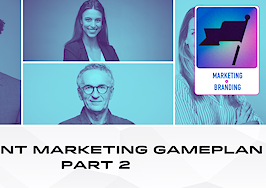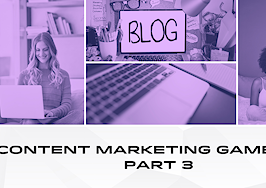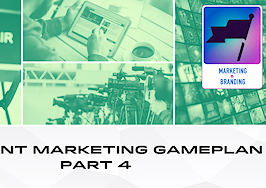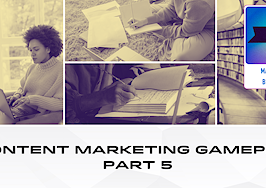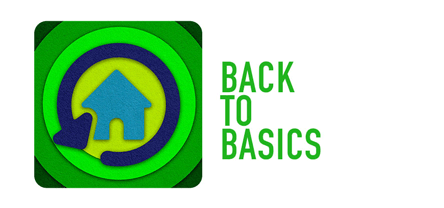 There’s so much noise out there on how to navigate a challenging market. This April, let Inman help you cut through the clutter to make smart business decisions in real time. All month long, we’re taking it Back to Basics and finding out how real estate pros are evolving their systems and investing personally and professionally to drive growth.
There’s so much noise out there on how to navigate a challenging market. This April, let Inman help you cut through the clutter to make smart business decisions in real time. All month long, we’re taking it Back to Basics and finding out how real estate pros are evolving their systems and investing personally and professionally to drive growth.
This article was last updated April 2, 2023.
Russell Volk, a Realtor in Bucks County, Pennsylvania, knew the moment hustle culture had taken over his life.
“I was working non-stop: lots of clients, appointments, phone calls, emails and closings. One evening I came home after an appointment around 8 p.m., and my whole family yelled ‘Happy birthday!’ as I walked through the door. Imagine my surprise, since I forgot it was my birthday,” he recalled.
On one level, the story is funny and relatable — we’ve all, no doubt, had those times when work became so overwhelming it seemed to consume every waking minute. However, there’s a difference between hustle and hustle culture — and that difference can have major implications for your health and success.
The #HustleHarder study

Credit: Ted Irvine / Inman
Hustle culture is rooted in the idea that more effort, more hours and more dedication are all that is required for success. It posits that everything else — family, friends, health and happiness — should be secondary to relentless hard work. It’s less about work ethic and more about self-sacrifice on the altar of more money, more status and more stuff.
For real estate professionals, it’s easy to get caught up in the idea that every phone call, every text and every email is equally important.
Kari S. Walker, a Lafayette, Louisiana, agent, experienced this sense of anxiety early in her career.
“I struggled with setting personal and professional boundaries with clients, putting me on the hamster wheel to burnout and gaining 20 pounds. With technology and the pressures of ‘speed to lead,’ I felt like I had to answer all the notifications on my phone at all hours of the day for fear if I left that one 11 p.m. email unresponded, the lead would move on and leave me in the dust,” Walker said.
The turning point for her was the sense that suddenly “real estate wasn’t fun anymore.” She spent some time developing healthy boundaries with clients and prospects, investing in a digital scheduling system and creating a series of client onboarding drip campaigns.
“Now I can respect myself as an entrepreneur and not just another burnt-out agent diluting their efforts and unable to give their best when it counts. Oh, and I’ve lost that 20 pounds!” Walker said.
A recent study by Proof Factor was called “#HustleHarder: A Study of Mental Health in the Entrepreneurship Community.” The study was the brainchild of Proof Factor Founder Val Gui, and it was based in part on his own experiences as a young entrepreneur.
“When I was working with my last company, my co-founder and I bought into the toxic hustle culture,” said Gui in an email to Inman. “When you’re a founder and things aren’t going well, you have nobody to turn to. You can’t talk to your employees about your problems, and you can’t talk to your investors or partners because you have to present a rosy image or risk them dumping you.”
The isolation and anxiety can manifest itself in self-destructive behaviors that actually undermine your goals, according to Gui. “Toward the end, me and my co-founder would polish off two to three bottles of wine out of misery and nowhere else to turn. It was an incredibly isolating and demoralizing experience.”
According to Gui’s study, at any given time 31 percent of entrepreneurs and startup founders worry that they are going out of business. Out of the approximately 30 million small and medium-sized businesses in the country, that means around 10 million people are going through this level of anxiety, often without feeling that they can reach out for help or discuss their fears.
Hustle culture messaging

Credit: Ted Irvine / Inman
We’ve all seen hustle culture at work, especially online and in our social media feeds. Sometimes called “The Grind” or “Grind Culture,” it’s an amalgam of The Secret’s positive thinking and manifestation philosophy mixed with an aggressive helping of shame and scolding.
Here are just a few quotes chosen at random from prominent online sources:
- Kim Kardashian’s “Get your f****** ass up and work”
- “I rarely get to see my kids. That’s a risk you have to take.” – Apple
- “Sleep deprivation is my drug of choice.” – Fiverr
- “Nobody is too busy. It’s just a matter of priorities.” – Various sources
- “Nobody cares. Work harder.” – Cameron Hanes
- “If you’re not rich yet, it’s your fault.” – Jack Ma / Various sources
Added to these over-the-top messages are images of wealth: exotic sports cars, expensive watches and lavish homes. Comically, the #HustleHarder study points to one of the most prominent meme models of grind gurus and the fictional embodiment of this kind of excess: Tony Montana, Al Pacino’s drug-addled crime lord from Scarface.
While hard work, big goals and high achievement are essential for entrepreneurial success, the excessive emphasis on wealth at all costs with no regard for health, family or balance — coupled with the isolation identified in the study — can be a dangerous and toxic mix.
In real estate, it might not be the search for excessive wealth; just building your business and reaching for the next level over and over again can inspire similar feelings.
Finding balance

Credit: Ted Irvine / Inman
How, then, can we find a balance that allows us to pursue our biggest goals while also staying healthy and happy? Dr. Darlene Treese, an Orlando, Florida-based therapist and life coach who specializes in working with business leaders and entrepreneurs, says that part of the key is looking at our underlying motives for excessive busyness.
“For some, it is their basic insecurity and fears of being compared to others and coming up short. It’s as if they are saying ‘please notice the long hours I work and ignore how little I do,’” Treese said.
For others, being busy helps them to delay or avoid the most important tasks, to avoid the possibility of failure or disappointment. If you’re too busy to begin, you never have to face failure.
Still others use busyness “to avoid the most important relationship that they could ever have — the one you have with yourself. We avoid time alone spent in introspection because we dread the inner dialogue of self-criticism and judgment or mindless chatter.”
Dr. Treese suggests hitting pause first thing in the morning with 10 minutes “to breathe, to relax and focus your attention on something that’s mundane, repetitive and predictable, like the sound of ocean waves or the hum of a fan or air conditioner. In that space of quiet your connection is made.”
Here are some additional ideas for taking back your time and carving out space in your busy schedule.
- Take a look at the messages you are consuming through your social media feeds, blog subscriptions, podcasts and more. Consider unfollowing accounts that engage in shaming or other negative behaviors. Look for balanced messaging that acknowledges your need for self-care while also acknowledging your goals and hard work. Dan Harris’s 10% Happier book and podcast are good places to begin.
- If you’re constantly feeling that you’re falling behind, consider taking a day or two and working on streamlining your processes, implementing some productivity apps or systems, time-blocking to return some time to yourself and your family, and other ways of getting a handle on your days.
- Institute some time that is just for you and your family. Choose to pick up your kids from school to provide you with some unstructured time to chat. Block out an hour for a nightly family dinner, and make that time sacred. Take one day a week, and set it aside as your day of rest. Make family time a non-negotiable part of your week.
- If you are struggling with feelings of isolation and anxiety, don’t deny them or shame yourself for them. Find someone to talk to, and commit to that time to regularly decompress and communicate your fears and feelings to another person.
- If you find that you are self-medicating with alcohol, drugs or a compulsive behavior like shopping or gambling, reach out for help to redirect your anxiety into more appropriate avenues or find help.
As both Volk and Walker demonstrated, your ambition is a powerful motivator, and your commitment to your real estate business is a necessary tool. Make sure, however, that you don’t forget yourself, your needs and your family during the process of creating your kingdom.
Christy Murdock is a freelance writer, coach and consultant and the owner of Writing Real Estate. Connect with Writing Real Estate on Instagram and subscribe to the weekly roundup, The Ketchup.


